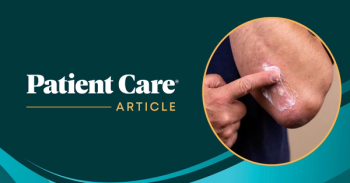
Neurotic Excoriations
A 56-year-old woman insisted on an “emergency” appointment due to the relentless appearance of pruritic skin “lesions” on the arms and legs. She admitted to manipulating the skin (scratching, picking, gouging) in an attempt to lessen associated itching.
A 56-year-old woman insisted on an “emergency” appointment because of the relentless appearance of pruritic skin “lesions” on the arms and legs. She admitted to manipulating the skin (scratching, picking, gouging) in an attempt to lessen associated itching. Recent complete blood cell count, biochemistry panel, urinalysis, chest film, TB skin test, and Pap smear results were negative or normal.
Key point: Inflammed excoriations were present, as were many straight line and sharply polyangulated, atrophic, hypopigmented scars. The latter indicate both chronicity and self-induction of the post-traumatic scars. A biopsy of the freshest lesion was done to assuage the patient’s conviction that this was a terminal disease; the biopsy showed only acute and chronic dermal inflammation. Having excluded essentially all underlying reasons for itch, and taking into account the patient’s own admission of traumatizing the skin, a diagnosis of neurotic excoriation was made. Had the lesions been thicker, prurigo nodularis would be a more appropriate term.
Treatment: Soporific doses of oral antihistamine were administered by mouth and anti-itch cream (pramoxine) was applied daily. In between applications, the affected areas were wrapped with an elastic bandage to preclude picking and scratching.
Note: Such cases are often quite challenging and assistance from a mental health professional may be useful.
Newsletter
Enhance your clinical practice with the Patient Care newsletter, offering the latest evidence-based guidelines, diagnostic insights, and treatment strategies for primary care physicians.

































































































































